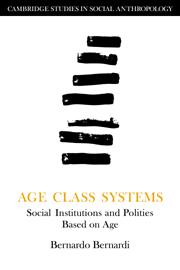Book contents
- Frontmatter
- Contents
- Translator's Preface
- Preface
- 1 Characteristics of age class systems
- 2 The anthropological study of age class systems
- 3 Legitimation and power in age class systems
- 4 The choice of ethnographic models
- 5 The initiation model
- 6 The initiation-transition model
- 7 The generational model
- 8 The residential model
- 9 The regimental model
- 10 The choreographic model
- 11 Women and age class systems
- 12 The ethnemic significance of the age class system
- 13 History and changes in age class systems
- Glossary
- References
- Index
Translator's Preface
Published online by Cambridge University Press: 29 September 2009
- Frontmatter
- Contents
- Translator's Preface
- Preface
- 1 Characteristics of age class systems
- 2 The anthropological study of age class systems
- 3 Legitimation and power in age class systems
- 4 The choice of ethnographic models
- 5 The initiation model
- 6 The initiation-transition model
- 7 The generational model
- 8 The residential model
- 9 The regimental model
- 10 The choreographic model
- 11 Women and age class systems
- 12 The ethnemic significance of the age class system
- 13 History and changes in age class systems
- Glossary
- References
- Index
Summary
Bernardo Bernardi is one of the pioneers of the anthropological study of formal age group systems, His dissertation work, under Isaac Schapera, in the early 1950s and his article “The age systems of the Nilo-Hamitic peoples,” appearing in the journal Africa in 1952, helped catalyze research on this fascinating topic. This book represents a culmination of a lifetime of work, including many years spent among the peoples of southern and eastern Africa.
Although the nature of age group systems has become one of the classic issues in modern social anthropology, it has proved to be a complex and often elusive topic. There are a large number of individual case studies of African societies with formalized age groupings, but surprisingly few full-scale comparative analyses of such systems. The result is that substantial confusion is evident in discussion of these systems, as reflected in the treatment anthropologists give the subject in introductory textbooks (Kertzer 1978). Yet, paradoxically, despite the lack of suitable comparative and general materials on age group systems, an increasingly wide range of social scientists are citing such systems in connection with the expansion of scholarly interest in the process of aging. The fact that sociologists, for example, so often refer to Eisenstadt's (1956) secondary analysis of age group systems, although a tribute to the enduring value of that work, bespeaks the dearth of more up-to-date and accessible materials on the subject, despite the outpouring of individual ethnographic accounts of age group systems over the past three decades.
- Type
- Chapter
- Information
- Age Class SystemsSocial Institutions and Polities Based on Age, pp. xi - xiiPublisher: Cambridge University PressPrint publication year: 1985



